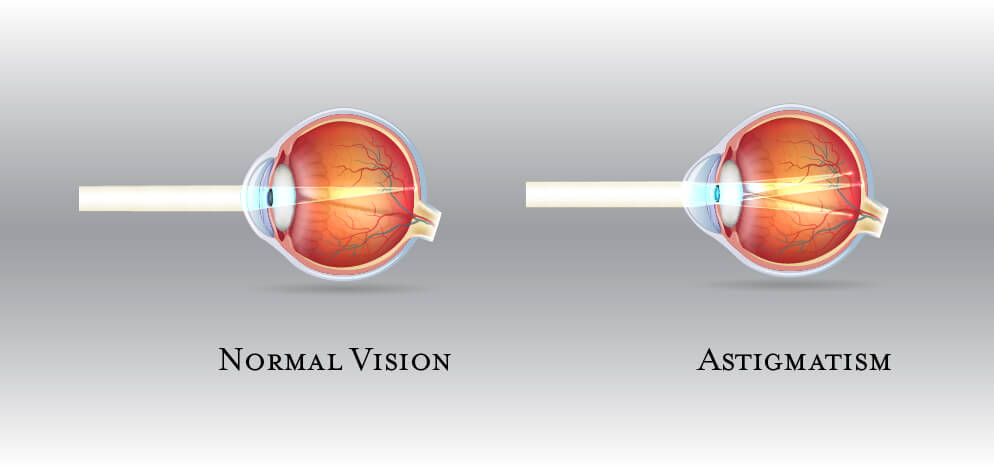Astigmatism
Astigmatism is an imperfection in the curvature of the cornea or lens of the eye. If the cornea or lens is irregularly shaped, the light that enters the eye isn’t refracted properly, resulting in distorted vision. If the imperfection lies with the cornea, it is called corneal astigmatism. If it’s the lens that is distorted, it’s called lenticular astigmatism.

What Are Symptoms Of Astigmatism?
People with astigmatism experience blurred vision with objects both near and at a distance. Depending on the severity of the astigmatism, it’s often described as looking through a funhouse mirror, where objects are either too tall, too short, too wide, or too thin. Astigmatism frequently occurs in both nearsighted and farsighted patients.
It can also cause double vision, eye strain, fatigue, and headaches. Some research has linked astigmatism to the prevalence of migraines in some patients.
What Causes Astigmatism?
The cause of astigmatism is unclear, but it is believed to be linked to genetics. Although doctors don’t know why corneal shape differs from one person to another, they do agree that the likelihood of having astigmatism is inherited. It’s a very common condition, affecting approximately one in three people worldwide.
Although usually present from birth, astigmatism can develop after an eye injury or eye surgery.
How Is Astigmatism Treated?
Astigmatism is generally treated in one of three ways – glasses, contacts, or surgery.
Eyeglasses for this condition contain a special cylindrical lens prescription that compensates for the astigmatism, providing additional power in specific parts of the lenses. Typically, single-vision lenses are prescribed for clear vision at all distances, but patients over 40 with presbyopia may require bifocals or progressive lenses.
Some patients may achieve better results with contacts, but not usually the standard soft contact lenses. Rigid gas-permeable contacts may be needed to compensate for the irregular shape of the cornea.
Though most people choose to correct their vision with glasses or contacts, astigmatism can also be corrected by reshaping the cornea through refractive surgery, such as LASIK or PRK. Through LASIK, a small flap is created in the cornea and some tissue is reduced, while PRK (photorefractive keratectomy) involves reduction of the outer layer of the cornea called the epithelium.
An eye exam with the doctors at EyeCare Optical can determine if you have any astigmatism and the proper prescription for glasses or contacts.
People Over The Age Of 50 Should See An Eye Care Professional Every Year.
Regardless of your degree of astigmatism, our staff at EyeCare Optical would love to help you achieve your best possible vision. Schedule an appointment with us today by calling (865) 584-0905. Our board-certified Optometrists are always ready to offer personal care and state-of-the-art technology with 6 convenient locations in North Knoxville (Fountain City), Farragut, Hardin Valley, Maryville, Oak Ridge and Sevierville.

